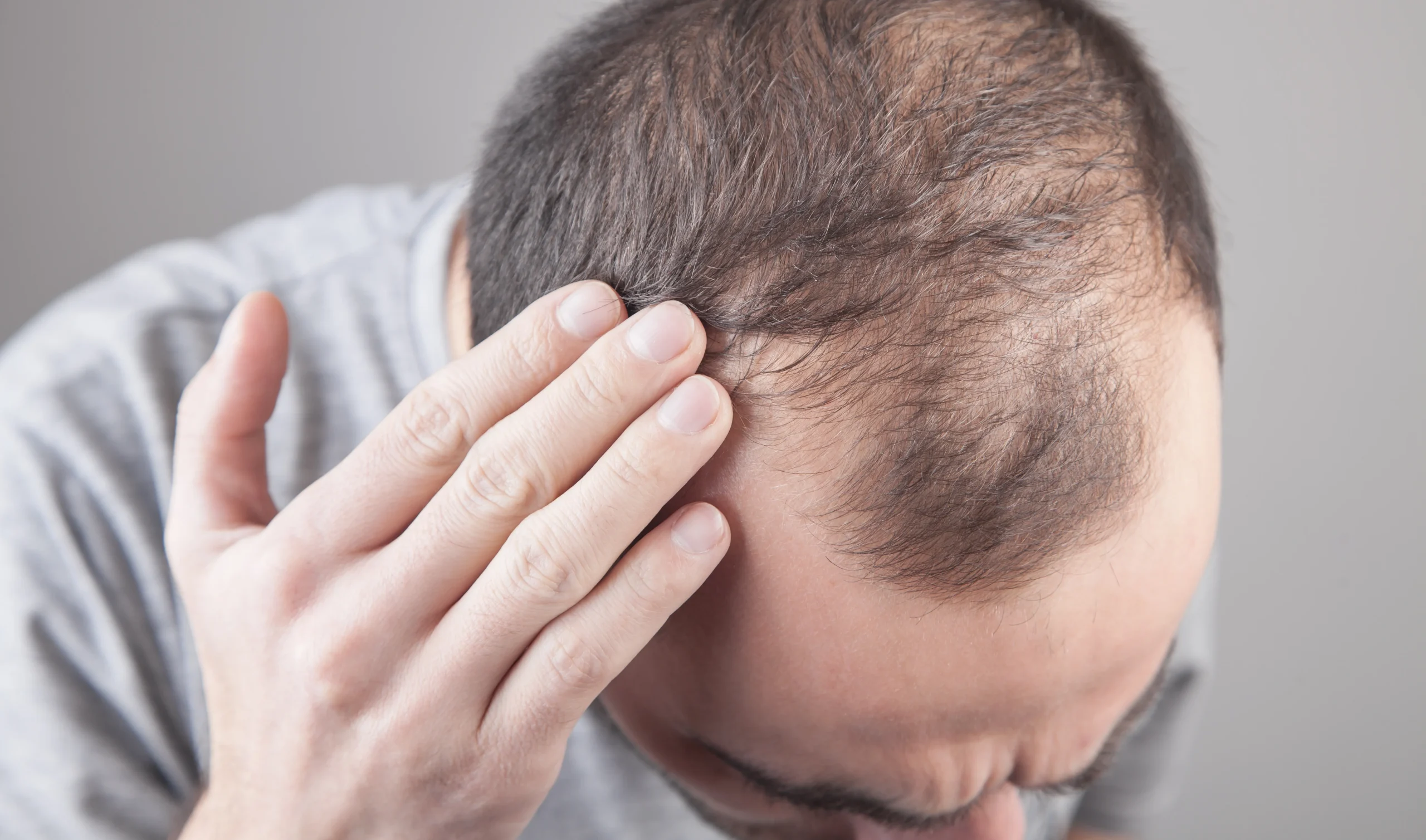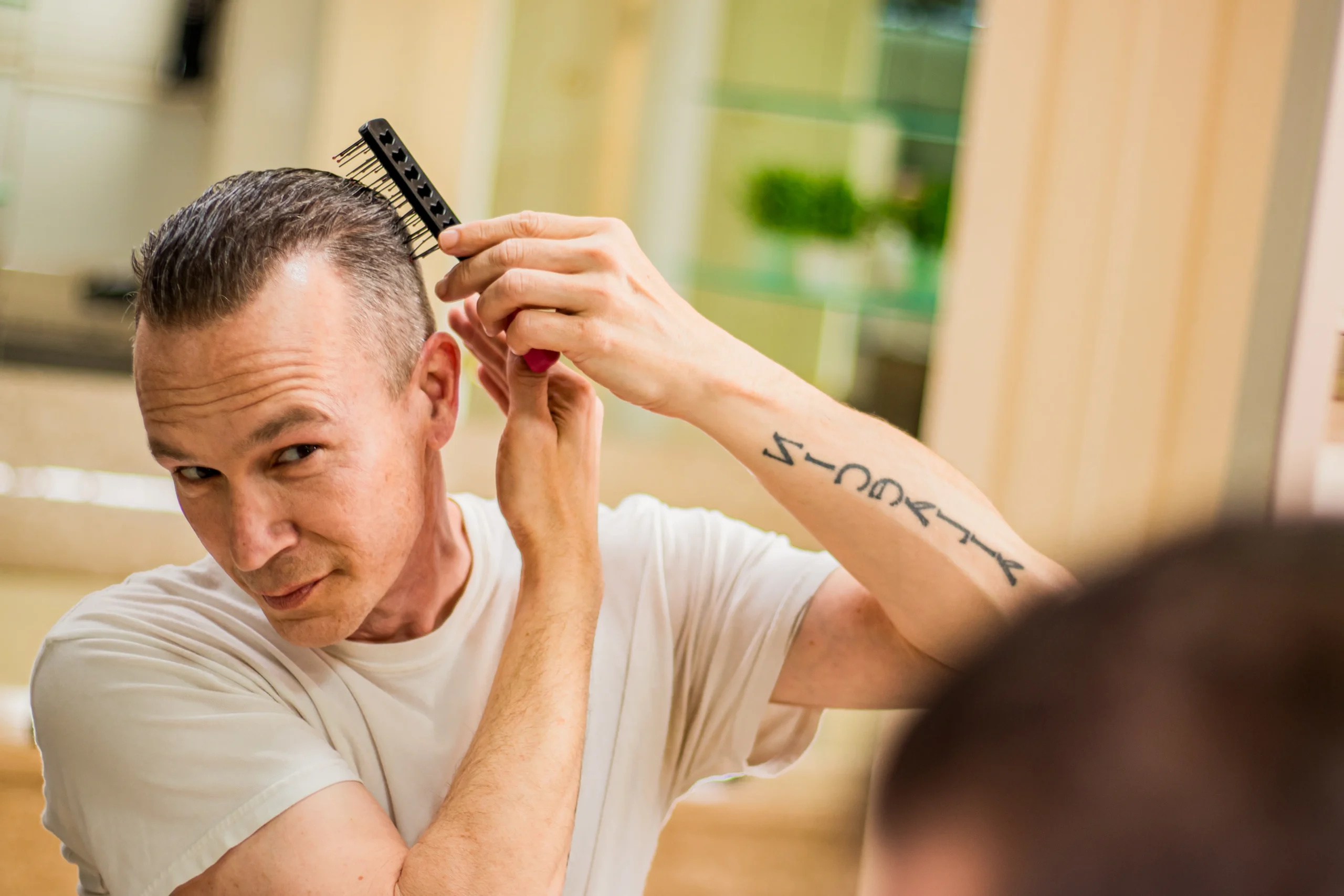If you’re in the earlier stages of hair loss, Minoxidil can help regrow your hair and slow further loss.
Originally tested in the 1960s as an oral medication to treat high blood pressure, Minoxidil was found to increase hair growth in some patients. While it was first dismissed by doctors as a harmless side effect, by the late 1980s, a topical formula had been developed to treat men experiencing hair loss, with women following in 1992. Today, Minoxidil is the only FDA-approved topical treatment clinically proven to help regrow hair.
The History of Minoxidil
The history of Minoxidil is one of serendipity and innovation. The Pharmaceutical Journal’s “How Minoxidil was Transformed from an Antihypertensive to Hair-Loss Drug” dives deeper into the drug’s unique past. An unexpected outcome of increased hair growth during clinical trials of an antihypertensive led researchers to investigate its potential as a treatment for hair loss, a condition that affects millions of people worldwide.
The Upjohn Company (now part of Pfizer) began researching the use of Minoxidil for hair loss treatment in the 1970s, and in 1988, the US Food and Drug Administration approved 2 percent Minoxidil as a topical treatment for male pattern hair loss. Since then, it has become a widely used and effective hair loss treatment, with formulations available in different strengths.
The origin of Minoxidil emphasizes the importance of chance discoveries in drug development and highlights how Minoxidil’s transformation from an antihypertensive drug to a hair loss treatment has helped countless individuals regain their confidence and combat hair loss. Learn more about how Minoxidil works and what to expect from treatment. Now Minoxidil remains a popular and effective treatment for hair loss, and its history serves as a reminder of the power of scientific discovery and innovation in improving people’s lives.
How Does Minoxidil Work?
To understand how Minoxidil works, it helps to understand what causes hair loss. The most common cause of hair loss is genetic, a condition known as androgenetic alopecia. This hereditary condition is progressive and causes hair follicles to shrink, producing thinner, finer hairs over time. Eventually, the follicle stops producing hair altogether. Hereditary hair loss occurs because of an inherited hormonal sensitivity passed down from either or both biological parents. For men, it’s often called male pattern baldness because it follows a pattern of loss at the temples and/or crown. For women, hair loss doesn’t always follow a recognizable pattern. It may present as a widening part, patchy hair loss or thinning all over.
Although the exact mechanism by which Minoxidil works is not fully understood, the treatment is a vasodilator, meaning it widens the blood vessels to deliver more oxygen-rich blood to the hair follicles. Minoxidil also helps increase the size of hair follicles, which promotes the growth of thicker, stronger hairs. In addition, the topical treatment shortens the resting (telogen) phase of hair growth, which means your hair stays in the growth (anagen) phase longer.
An Experimental Study of Minoxidil Effectiveness
In 2004, Johnson & Johnson conducted “A Study to Evaluate the Effectiveness and Safety of 5 Percent Minoxidil Foam in the Treatment of Male Pattern Hair Loss” aimed to expand our knowledge of Minoxidil’s ability to promote hair regrowth. The study was a randomized, double-blind, placebo-controlled trial that included 352 male participants aged 18 to 49 years who had androgenetic alopecia.
Participants were randomly assigned to receive either 5 percent Minoxidil foam or a placebo foam for 16 weeks. The primary outcome measure was the change in non-vellus hair count determined by a computer-assisted dot-mapping technique from baseline to week 16. Secondary outcome measures included change in hair diameter, overall hair growth and appearance, and patient-reported outcomes.
The results of the study showed that the Minoxidil group had a significantly greater increase in non-vellus hair count compared to the placebo group at week 16. Additionally, the Minoxidil group had a significantly greater improvement in global photographic assessment scores and patient self-assessment scores compared to the placebo group at week 16. The study also found that the Minoxidil foam was safe and well-tolerated by the participants.
In conclusion, the study demonstrated that 5 percent Minoxidil foam is an effective and safe treatment for male pattern hair loss, as it significantly increases non-vellus hair count.
How to Regrow Your Hair with Minoxidil 5% or 2% Topical Solutions
Our solution, EXT Extreme Hair Therapy®, includes Hair Regrowth Treatment (Minoxidil) to help regrow hair and minimize further loss. Minoxidil is available in concentrations of 2% and 5% topical solution for men and 2% topical solution for women*. EXT also includes specially formulated cleansers, conditioners and supplements designed to improve the look and feel of your hair while providing an optimal environment for hair growth.
EXT clients also enjoy monthly in-center visits where they receive professional advice, digital progress tracking and salon services. During each session, clients get a relaxing hair and scalp treatment performed by one of our licensed cosmetologists. Then, their hair is expertly washed, cut and styled so they walk out looking great and feeling even better.
Hair loss happens to millions of men and women. But, with EXT, you don’t have to accept thinning hair—you can fight back! When used daily as directed, Minoxidil can regrow your hair and slow or even stop further loss. Plus, the EXT products work together to increase your hair’s shine, body and manageability.
With EXT, you’re no longer at the mercy of your hair loss. You’re back in the driver’s seat. To find out if EXT is right for you.
Schedule your free consultation with a Certified Hair Loss Specialist at one of our 100+ locations in the US, Canada and Puerto Rico now. You’ll learn about your level of hair loss and receive a customized hair restoration plan tailored just for you. Don’t wait, the sooner you act, the more options you will have.





